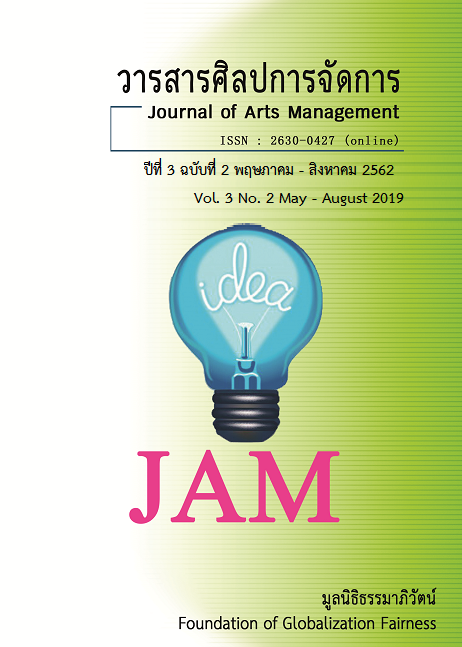Family Role on Social Skills Development of Autistic Children in Dome Nursery School under the Office of the Basic Education Commission, Bangkok
Main Article Content
Abstract
This research aims to (1) study and compares the role of families in the development of social skills of autistic children in Dome Nursery School Under the Office of the Basic Education Commission, Bangkok. The sample size was calculated using Krejcie and Morgan at the confidence level of 95% of the 100 population. The samples were 80 and simple random sampling was used. Research tools a questionnaire about family roles on social skills development of autistic children. Dome Nursery School under the Office of the Basic Education Commission Bangkok The reliability of the questionnaire was 96. the results are as follows.
- Results of the study on family roles on social skills development of autistic children. Dome Nursery School under the Office of the Basic Education Commission Bangkok and the whole. Very high
- Results of comparison of family roles on children's social skills development. Wisdom Dome Nursery School under the Office of the Basic Education Commission, Bangkok in different marital status and adjustment/problem-solving. Interpretation and life. There was no statistically significant difference at .05 level. And the relationship. There was a statistically significant difference .05
- Results of comparison of family roles on children's social skills development. Wisdom Dome Nursery School under the Office of the Basic Education Commission, Bangkok in a different family-style by overview. And adaptation /problem-solving. Interpretation and self-control. There was no statistically significant difference at .05 level. And the relationship. There were statistically significant differences at the .05 level.
Article Details
Views and opinions appearing in articles in the Journal of Arts of Management It is the responsibility of the author of the article. and does not constitute the view and responsibility of the editorial team I agree that the article is copyright of the Arts and Management Journal.
References
ธีรยุทธ์ เสนีวงศ์ ณ อยุธยา. (2536). แนวคิดการพัฒนาหลักสูตร. กรุงเทพฯ: มหาวิทยาลัยสุโขทัยธรรมาธิราช.
ดารณี อุทัยรัตนกิจ. (2545). การจัดการเรียนร่วมสําหรับเด็กออทิสติกในโรงเรียนสาธิตแห่งมหาวิทยาลัยเกษตรศาสตร์. กรุงเทพฯ: มหาวิทยาลัยเกษตรศาสตร์.
นิรันดร์ คำยอง, (2550), บทบาทของครอบครัวในการเสริมสร้างศักยภาพของนักเรียนชั้นมัธยมศึกษาปีที่ 5 ที่มีผลสัมฤทธิ์ทางการเรียนสูง โรงเรียนรังสีวิทยา. วิทยานิพนธ์ศึกษาศาสตร์มหาบัณฑิต, มหาวิทยาลัยเชียงใหม่.
เพ็ญแข ลิ่มศิลา. (2545). คู่มือการฝึกและดูแลเด็กออทิสติก. กรุงเทพฯ:โรงพยาบาลยุวประสารทไวทโยอุปถัมภ์.
มัทนา บุญสิงห์. (2554). บทบาทครอบครัวต่อการพัฒนาทักษะทางสังคมของเด็กสมาธิสั้น: ศึกษาเฉพาะกรณี สมาชิกชมรมผู้ปกครองบุคคลสมาธิสั้นแห่งประเทศไทย กรุงเทพมหานคร. วิทยานิพนธ์สังคมศาสตรมหาบัณฑิต, มหาวิทยาลัย ธรรมศาสตร์.
ศรีกัลยา พึ่งแสงสี. (2539). การศึกษาพฤติกรรมของครูในการส่งเสริมทักษะทางสังคมให้แก่นักเรียนชั้นประถมศึกษาปีที่ 6 โรงเรียนประถมศึกษาสังกัดสำนักงานการประถมศึกษา. วิทยานิพนธ์ครุศาสตรมหาบัณฑิต จุฬาลงกรณ์มหาวิทยาลัย.
สาวิตรี แสงศิลป์. (2551). บทบาทของครอบครัวและสถานศึกษาในการพัฒนาพฤติกรรมรับผิดชอบต่อสังคมของนักเรียน. วิทยานิพนธ์ศึกษาศาสตรมหาบัณฑิตมหาวิทยาลัยขอนแก่น.
สำนักงานรับรองมาตรฐานและประเมินคุณภาพการศึกษา. (2547). พระราชบัญญัติการศึกษาแห่งชาติ พ.ศ. 2542 แก้ไขเพิ่มเติม (ฉบับที่ 2) พ.ศ. 2545.
Cook and Others. (1996). Initial national report on the convention of the rights of the child.
Howlin P., Baren, Cohen, S., & Hadwin, J. (1998). Teaching children with autism to mind-read: A practical guide for parents and professionals. West Sussex, England: John Wiley & Sons, Ltd.
Krejcie, R. V. & Morgan, D.W. (1970). Determining sample size for research activities. Education and Psychological Measurement, 30, 607-610.
